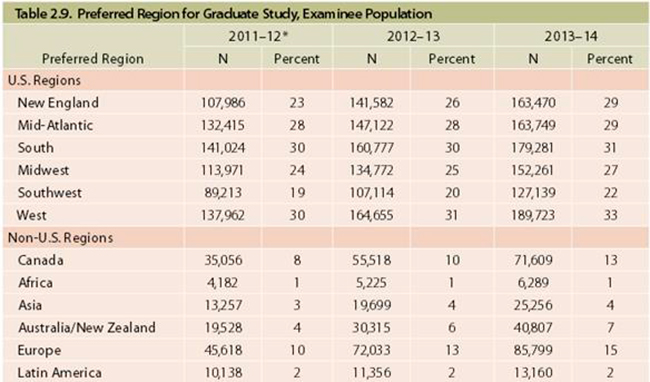
Prospective graduate and business school applicants take the GRE revised General Test as part of their application for admission to Master's degrees, MBAs, specialised Master's in business or doctoral degree programmes.
Below are the major highlights of a 2014 GRE report which will help you decide whether the GRE test is a good option for you on your way to Master’s or MBA admission.
Which GRE test?
There are two types of GRE tests – the GRE® revised General Test and Subject Tests in Biochemistry, Cell and Molecular Biology; Biology; Chemistry; Literature in English; Mathematics; Physics and Psychology.
If you will apply for admission to programmes in business and management-related fields, you should take the GRE revised General Test.
Who accepts the GRE?
The GRE revised General Test is accepted by a growing number of business schools for admission to MBA programmes as an alternative to the still dominant GMAT test.
Thousands of universities accept the GRE General Test – see full list here. Find the list of MBA programmes that accept the GRE test here
A snapshot of the GRE revised General Test examinees
In November, The Educational Testing Service, owner of the GRE, released its 2014 report “A Snapshot of the Individuals Who Took the GRE® revised General Test, August 2011–June 2014”.
The report provides valuable data which will help you to decide which of the two tests – the GRE revised General Test or the GMAT – will put you in a better position than other applicants for admission to graduate programmes in business and management-related fields.
Growing popularity
The report shows that the number of unique GRE test takers grew by 7% compared to the 2012–13 testing year.
Age
The majority of examinees (87%) were 30 years of age or younger.
Full-time work experience
50% of test takers had two years full-time work experience or less, including 53% of test takers who indicated that attaining the MBA was their graduate degree objective.
On average, test takers with more full-time work experience had higher Verbal Reasoning scores than those with less. However, test takers with less full-time work experience had higher Quantitative Reasoning scores.
Intended graduate field of study
GRE is taken by applicants for admission to graduate studies in Life Sciences (21%), Engineering (15%), Physical Sciences (12%), and Social Sciences (12%). Those who declared an interest in graduate business studies only number 5%, but there is a high proportion (19%) of respondents who either did not provide the intended major or are still undecided.

Country of citizenship
The countries with the highest number of test takers in 2013–14 were the United States (336,367), India (85,489), and Mainland China (42,098). The percentage of test takers who were U.S. citizens decreased from 68% in 2011–12 to 59% in 2013–14. The percentage of test takers who were non-U.S. citizens increased from 28% in 2011–12 to 36% in 2013–14.

Current educational level
The majority of the GRE revised General Test examinees are either still in their Bachelor’s degree programmes (last year of their studies) or have graduated, but are not yet enrolled in graduate programmes.

Preferred regions for graduate study
GRE revised General Test examinees declared their intention to study in the US (av. 29%), Europe (15%), Canada (13%)

In addition to this snapshot into GRE examinees, you should also consider other factors before you make a final decision about which test to take – the GRE or the GMAT. You should certainly check the requirements of the business schools where you will apply for admission, along with the structure and content of the two tests, their availability in your region, and other aspects which are important to you.



Comments